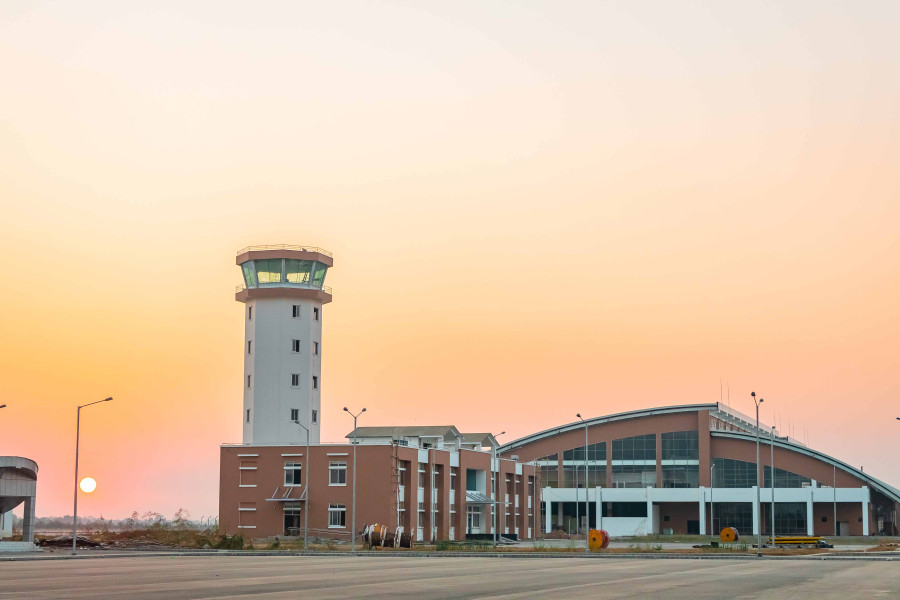Money
Aviation officials at their wits' end as budget still elusive
Insiders say the minister wants to make revisions to the budget which is why he has been holding back.
Sangam Prasain
Civil aviation officials are at their wits' end as nearly half the fiscal year has gone by, but their board chairman and tourism minister has been delaying passing the annual budget which, they say, has hit capital expenditure.
Tourism Minister Prem Bahadur Ale has been going off on foreign jaunts while officials of the Civil Aviation Authority of Nepal are awaiting his go-ahead to hold the second meeting of the board of directors, which he had promised to convene on October 29. Minister Ale heads the authority's seven-member board.
“The first meeting to discuss the budget was held on October 26 after Ale was appointed tourism minister on October 8. The second meeting, probably to finalise the budget, had been planned for October 29,” unnamed officials said. “There is no word from the minister now.”
Insiders said that the minister wanted to make revisions to the budget which is why he has been holding back. Ale returned from the World Travel Mart in London last week and flew off to New Delhi on Friday to participate in another event.
“Due to the minister’s busy schedule, we have not been able to pass the budget,” Raj Kumar Chhetri, director general of the Civil Aviation Authority of Nepal, told the Post. He declined to elaborate.
Sources privy to the matter said Minister Ale wanted to divert some budgetary funds from the budget to Dhangadhi in his home province and Doti which his election constituency.
“The budget of the civil aviation body is drafted by its employees. Obviously, politicians want to manipulate it. It’s not normal,” a highly-placed official at the authority said.
The Civil Aviation Authority of Nepal has proposed a bloated annual budget of Rs41.50 billion for this fiscal year 2021-22, ending mid-July 2022, betting on a rebound in the travel market and increased revenues as the vaccination drive picks up pace.
This year's budget is slightly higher than last year's which amounted to Rs41.11 billion.
Of the total budget, Rs31 billion has been proposed for capital expenditure. The capital budget is used to fund major infrastructure projects.
“The budget is delayed at the peak construction time. It’s a serious threat to development,” said another unnamed senior official.
Delays in passing the budget stop procurement processes. Such setbacks have been mainly responsible for hindering budget execution. When announcements for tenders are made early, it speeds up project implementation.
A late annual financial plan also prevents government entities from initiating procurement processes at the start of the fiscal year and making systematic cash release plans.
According to the Civil Aviation Authority of Nepal, sums of Rs12 billion and Rs10 billion have been earmarked this year for two international airports in Bhairahawa and Pokhara respectively. Both these projects are in the final phase of completion and are expected to come into operation by this fiscal year.
Similarly, Rs10 billion has been allocated for soil filling works and construction of international parking bays on the northern side of the runway at Tribhuvan International Airport (TIA) in Kathmandu. The project also includes the construction of a parallel taxiway on the southern side of the runway and a hangar on the eastern side of the runway.
The budget has set aside Rs600 million for the construction of a state-of-the-art international terminal (T2) building at Gautam Buddha International Airport in Bhairahawa.
The terminal currently being built has been deemed too small for an international terminal and will be repurposed for domestic flights. The 15,000-square-metre building, which is almost ready, has only six parking bays and lacks an aerobridge.
“There are major and critical works to be completed by this fiscal year. But the budget has still not been passed,” said the senior official. September-December is the best season for construction which is post-monsoon and pre-winter.
According to officials at the Civil Aviation Authority of Nepal, which has been performing a dual role of civil aviation regulator and service provider, the passage of the budget was initially delayed because newly installed Prime Minister Sher Bahadur Deuba failed to expand his Cabinet and appoint a tourism minister for nearly three months after being sworn in.
On October 8, Deuba named Prem Bahadur Ale as minister for culture, tourism and civil aviation. “A month has passed since the appointment, but the new minister is holding back approving the budget,” said a civil aviation official.
The civil aviation body’s revenue has also seen dramatic declines.
In the previous fiscal year 2018-19, the Civil Aviation Authority of Nepal earned revenues totalling Rs9 billion. In the last fiscal year 2019-20, income plunged 43 percent to Rs4.50 billion.
The airport had anticipated revenues to climb to Rs10.50 billion in 2019-20 following the launch of the Visit Nepal 2020 promotional campaign and resultant higher passenger traffic.
But Covid-19 came and disaster followed.
In 2020-21, the coronavirus situation went from bad to worse. Consequently, the authority had made a downward revision of its projected revenue to a rock bottom Rs2.67 billion. But it succeeded in collecting Rs2.95 billion.
The authority reported that Nepal’s civil aviation industry suffered losses amounting to Rs37 billion in the period between the first lockdown in March 2020 and the second lockdown in April 2021.
The largest portion of the authority’s income comes from passenger fees and landing and parking charges for aeroplanes. Airport development tax, passenger service charge, and parking and navigation charges account for the major earnings of the airport.




 20.12°C Kathmandu
20.12°C Kathmandu














